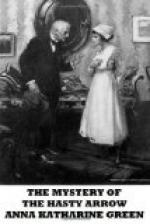Why so placed, and why regarded with such concentrated interest by the men confronting it from the opposite gallery, will become apparent when, upon the Indian’s being summoned from his place of modest retirement, it can be seen that the bow he carries in one hand is offset by the arrow he holds in the other. A test is to be made which will settle, or so they hope, the truth of Mr. Travis’ story. If an arrow launched from before the pedestal or even from behind it through the loophole made by the curving-in of the vase toward its base can be made to reach its mark in the breast of this dummy, then they would feel some justification in doubting his statement that the arrow, whatever the appearances, was not shot from this gallery. If it could not, belief in his statements would be confirmed and their minds be cleared of a doubt which must hamper all their future movements.
The second director, whose name was Clayton, stood at the left of the Inspector and close against the tapestry. To him that official now turned with this explanation:
“The bow you see in Mr. La Fleche’s hand is similar in length and weight to the one found lying strung for use in the doorway back of where you are now standing. The arrow is from the same quiver as the one which entered Miss Willetts’ breast.... Did you speak?”
No, Mr. Clayton had not spoken; yet for some reason a thrill had passed through the small group surrounding him, which had heightened the consciousness of them all. Eyes and ears became alert; only the Indian showed stolidity.
“Mr. La Fleche, you will first stand here,” continued the Inspector, pointing to the spot which Mr. Travis had finally settled upon as the one where he had been standing at the moment he saw Miss Willetts fall.
The Indian took the place, sighted the figure diagonally opposite and laid his finger on the string.
“An inch to the left of the bunch of flowers pinned on the dummy’s breast,” murmured Mr. Gryce almost in his ear.
It was a breathless moment; even the two detectives showed excitement.
But the Indian failed to shoot. Instead, he looked around at the Inspector and quietly remarked:
“I will shoot standing, since you so request, but I think you will find that the arrow which caused death was delivered by a man kneeling.”
A flash of the eye between the two detectives, which only one man saw! All the others were watching the lightning flight of the arrow. It struck the dummy full and square. Everyone shuddered, even the Inspector; it brought the real tragedy so vividly to mind.
Meanwhile a movement had taken place in the small group of men watching from the other side. One of them stepped fully into view and approaching the figure thus attacked, drew out the arrow and made close examination of the hole it had made and shook his head. It was Coroner Price.
“Try again, and from behind the pedestal this time,” he called out across the intervening space as he stepped back into his former place of observation.




